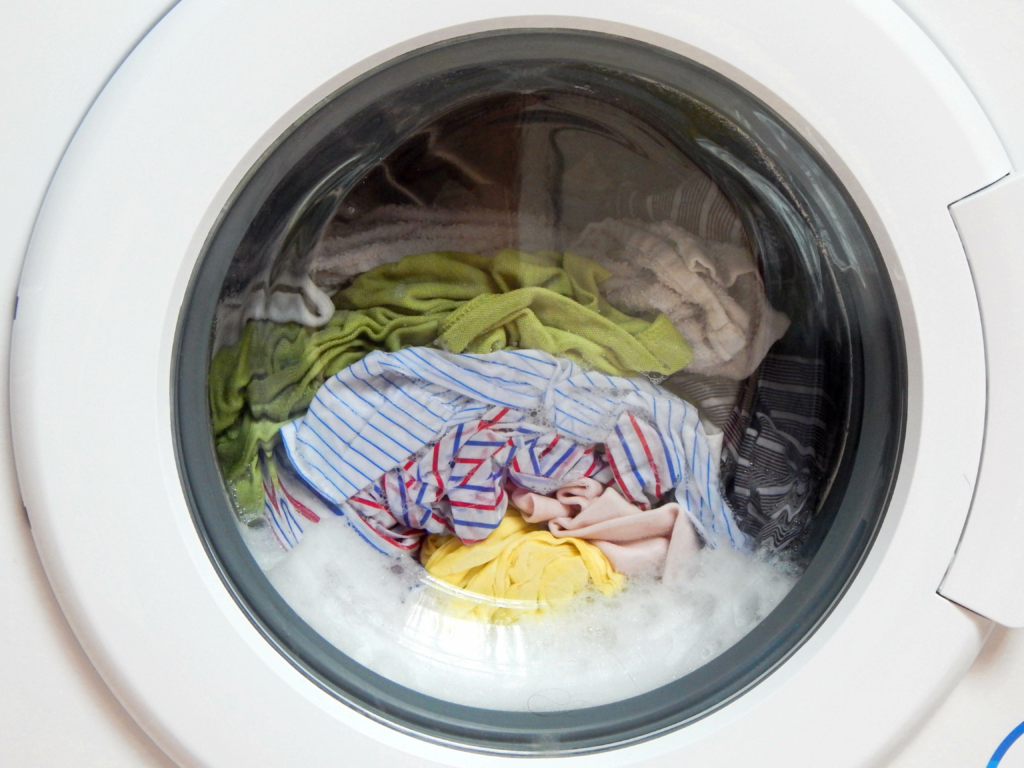
The Golden Rule of Laundry: Don’t Overfill Your Washer & Dryer
Find out how to get your clothes cleaner and make them (and your washer and dryer) last longer.

Laundry day: a task that most of us face with mixed feelings of annoyance and necessity. While it may not be the most exciting chore, it’s an essential part of maintaining clean and fresh clothing.
Despite Sir Suds Laundry Co. going to great lengths to make your visit enjoyable, many of us are guilty of trying to expedite the process by overloading our washing machines and dryers. In this blog post, we’ll explore why overfilling these appliances can be a major mistake and how to avoid it.
The Consequences of Overfilling
Poor Cleaning Performance
Reduced cleaning efficiency is one of the most immediate consequences of overfilling your washing machine. When you cram too many clothes into the drum, there’s less space for water and detergent to circulate freely. Dirt streaks and detergent stains can appear, and as a result, your clothes may not get properly cleaned, and stains and odors may persist. Over time, this can lead to the deterioration of your garments.
Excessive Wear and Tear
We get lots of people at Sir Suds Laundry Co. who’ have broken machines ‘s washers or dryers broke at home. Sometimes these breakdowns are caused by overloading, or trying to wash items that are too large or too heavy when wet. Overloading your washer and dryer puts extra strain on these appliances. The motors and components have to work harder to move and dry the extra weight, which can lead to premature wear and tear. This, in turn, may result in costly repairs or the need to replace your machines sooner than expected.
Uneven Drying
In the case of overfilling your dryer, you’re likely to experience uneven drying. Clothes on the outside of the load may dry faster than those in the center, leading to a mix of damp and overly dry garments. This inconsistency can damage fabrics and make ironing a nightmare.
Increased Energy Consumption
Overloading your washer and dryer not only affects your clothes but also your energy bills. When your machines have to work harder to handle larger loads, they consume more energy. This means higher electricity bills and a larger carbon footprint, which isn’t great for your wallet or the environment.
How to Avoid Overfilling
Follow the Manufacturer’s Guidelines
Start by familiarizing yourself with your washer and dryer’s user manual. Manufacturers typically provide guidelines on the maximum load capacity for each machine. Stick to these recommendations to ensure optimal performance and longevity. When you are at Sir Suds, ask the on-duty attendant for advice, or use your best judgement. If you have to ask yourself “is this too full”, it probably is!
Leave Room for Movement
When loading your washing machine, leave some space for clothes to move freely. Overcrowding the drum prevents proper agitation, which is necessary for thorough cleaning. As a general rule, your machine should be about two-thirds full to allow for efficient washing.
Shake Out Bulky Items
Before putting items like comforters, pillows, or heavy jackets in the dryer, give them a good shake to distribute the filling evenly. This will help prevent clumping and ensure that they dry more evenly and create a balanced load.
Use Dryer Balls
To improve air circulation in your dryer, consider using dryer balls. These simple additions help fluff and separate your laundry as it dries, reducing the risk of uneven drying. Don’t fill the dryer more than half-full to ensure the clothes have room to move and let the hot air circulate. By doing this, your clothes won’t have to tumble and be exposed to heat for as long, helping them last longer.
Prioritize Quality Over Quantity
When doing laundry, focus on quality rather than quantity. By washing and drying smaller, manageable loads, you’ll achieve better results and extend the life of your clothing and appliances.
Conclusion
In the world of laundry, less is often more. Overloading your washer and dryer may seem like a time-saving solution, but it ultimately leads to poor cleaning, excessive wear and tear, and increased energy costs. In addition, overloading the dryer will actually result in you spending longer waiting for everything to dry. By adhering to the manufacturer’s guidelines and practicing mindful laundry habits, you can keep your clothes fresh, your appliances in good condition, and your laundry days less stressful. Remember, the golden rule of laundry is simple: don’t overfill your washer or dryer, and you’ll reap the benefits in the long run.
If you have any questions on best practices while at the laundromat, or how the machines work, please ask one of our friendly on-duty attendants. You can also check out our frequently asked questions page for more info at FAQs | Sir Suds Laundry Co. – Answers to Your Laundry Queries. And to learn more about why overloading your machines can be troublesome, check out this article on Angie’s List: Why an Overloaded Washing Machines Is a Bad Thing (angi.com) Happy washing!



